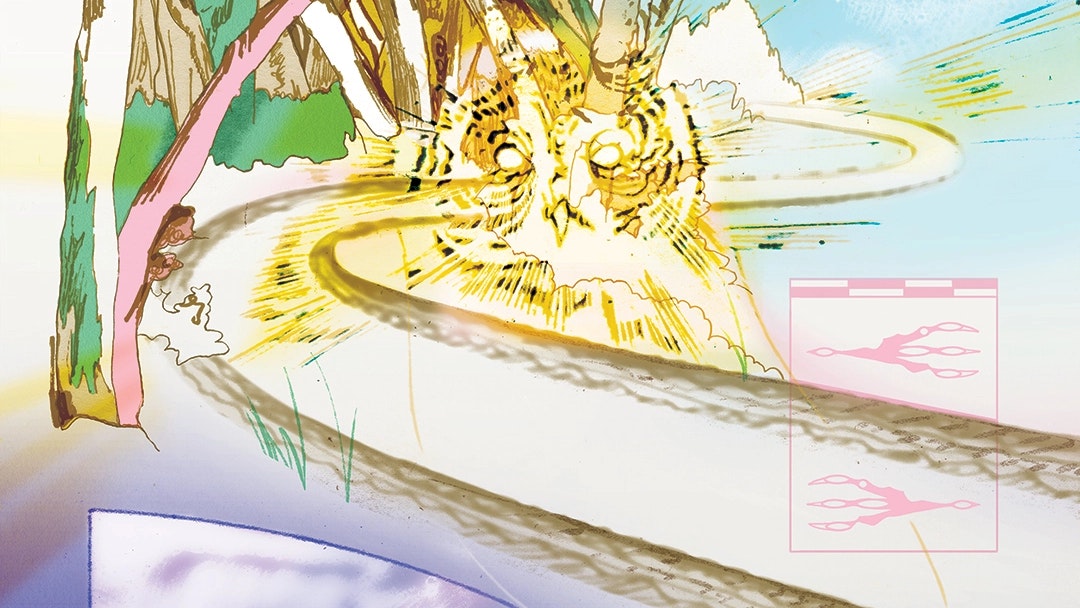What does the future of AI and creative coexistence look like in the workplace?
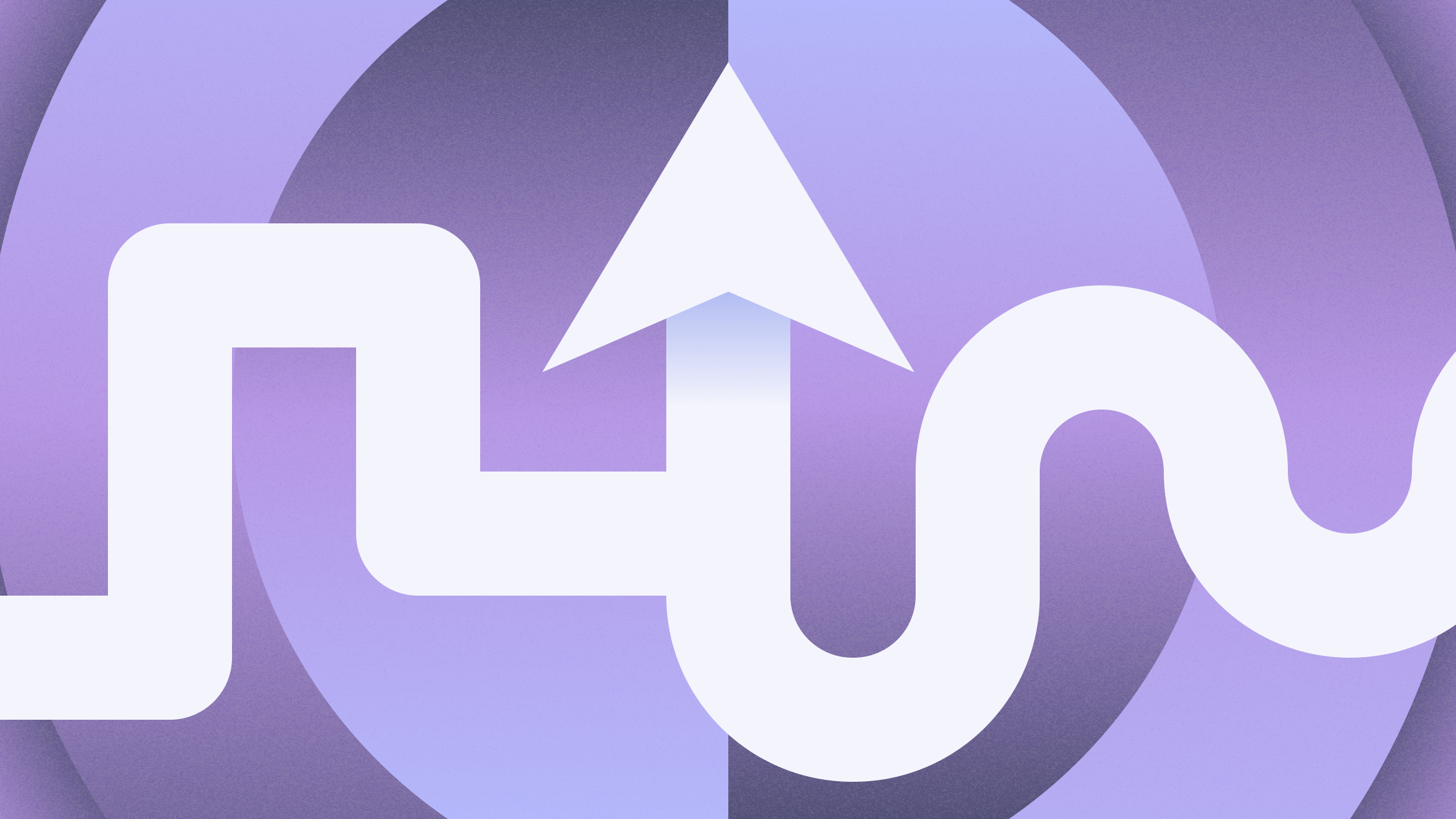
Artificial intelligence (AI), once a figment of sci-fi’s imagination, has rapidly become a fixture of our lives, changing the way we live and work — and sparking no shortage of controversy every step of the way. Startups and founders now find themselves at the forefront of a profound shift around creativity in the workplace, as many eagerly adopt AI to optimize processes, increase productivity, and cut costs. But for all its practical benefits, AI has adversely affected some teams, leaving creatives feeling devalued and concerned about job security. As AI’s capabilities continue to advance, it begs the question: What does the future of creativity look like in the business world?
To explore the impact of AI on creative processes, we surveyed 150 startup founders and 486 creative professionals across the U.S. about their experiences and sentiments. Creatives surveyed represent a wide spectrum of fields and job titles, ranging from art directors and graphic designers to content creators and videographers. Through their collective voices and thoughts, we start to answer the question: Is AI the enemy of creativity or a tool to help propel it to new heights?
Key takeaways
- 80% of startup founders have integrated AI into their creative processes.
- 55% of founders prefer human creativity over AI in their startups.
- 22% of founders have expanded their creative teams since advancements in AI, compared to 15% who have shrunk them.
- 41% of creatives have been promoted since their company adopted AI technologies.
Exploring AI integration in creative processes
To begin our study, we asked startup founders about the integration of AI into their businesses. How many are using AI in creative processes, what are they using it for, and how did creative teams respond to the implementation of AI tools?
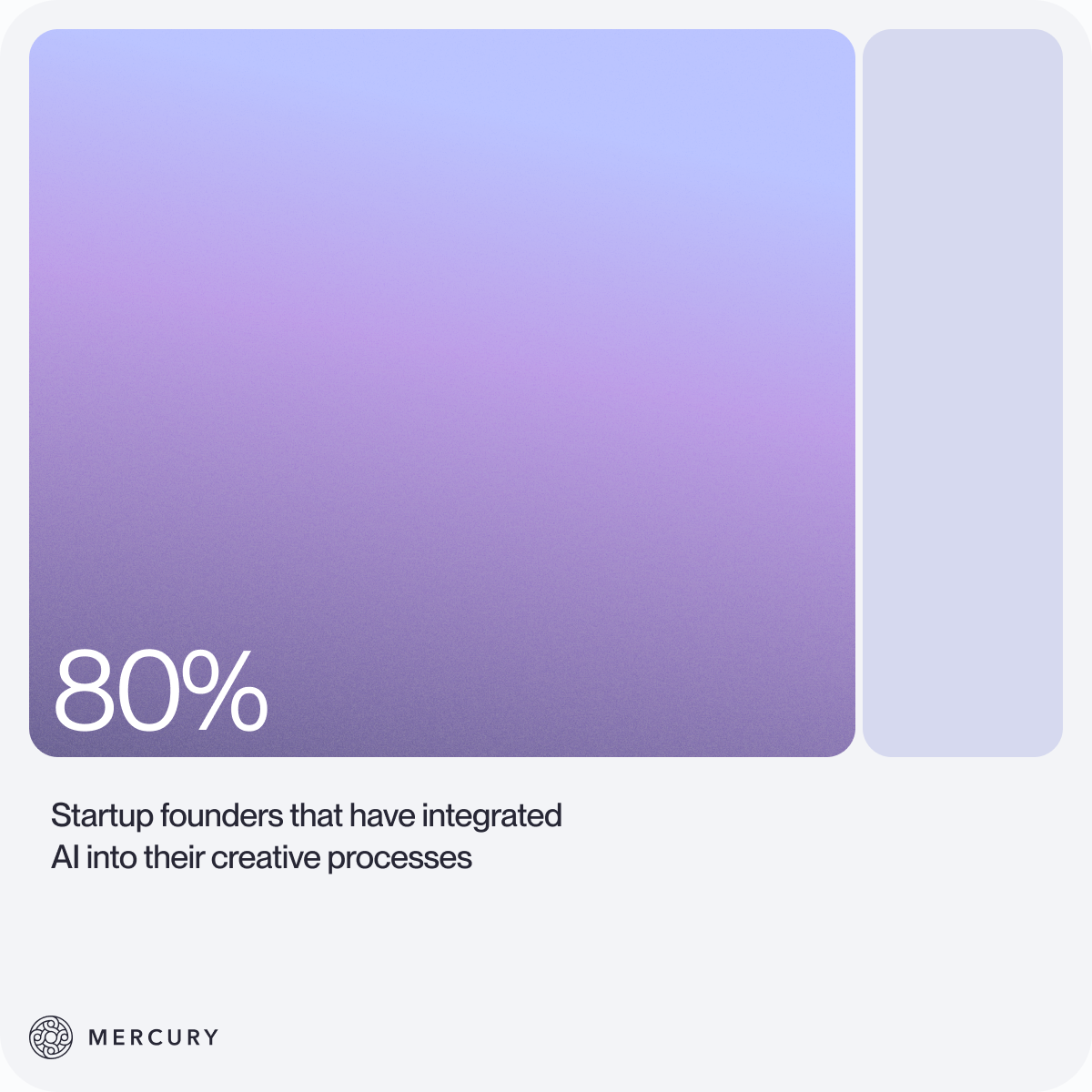
What we found was that a striking 80% of startup founders employed AI in their creative initiatives. Their top applications included data analysis to inform creative decisions (42%), graphic design enhancement (36%), and product development to identify and prioritize features or services (25%).
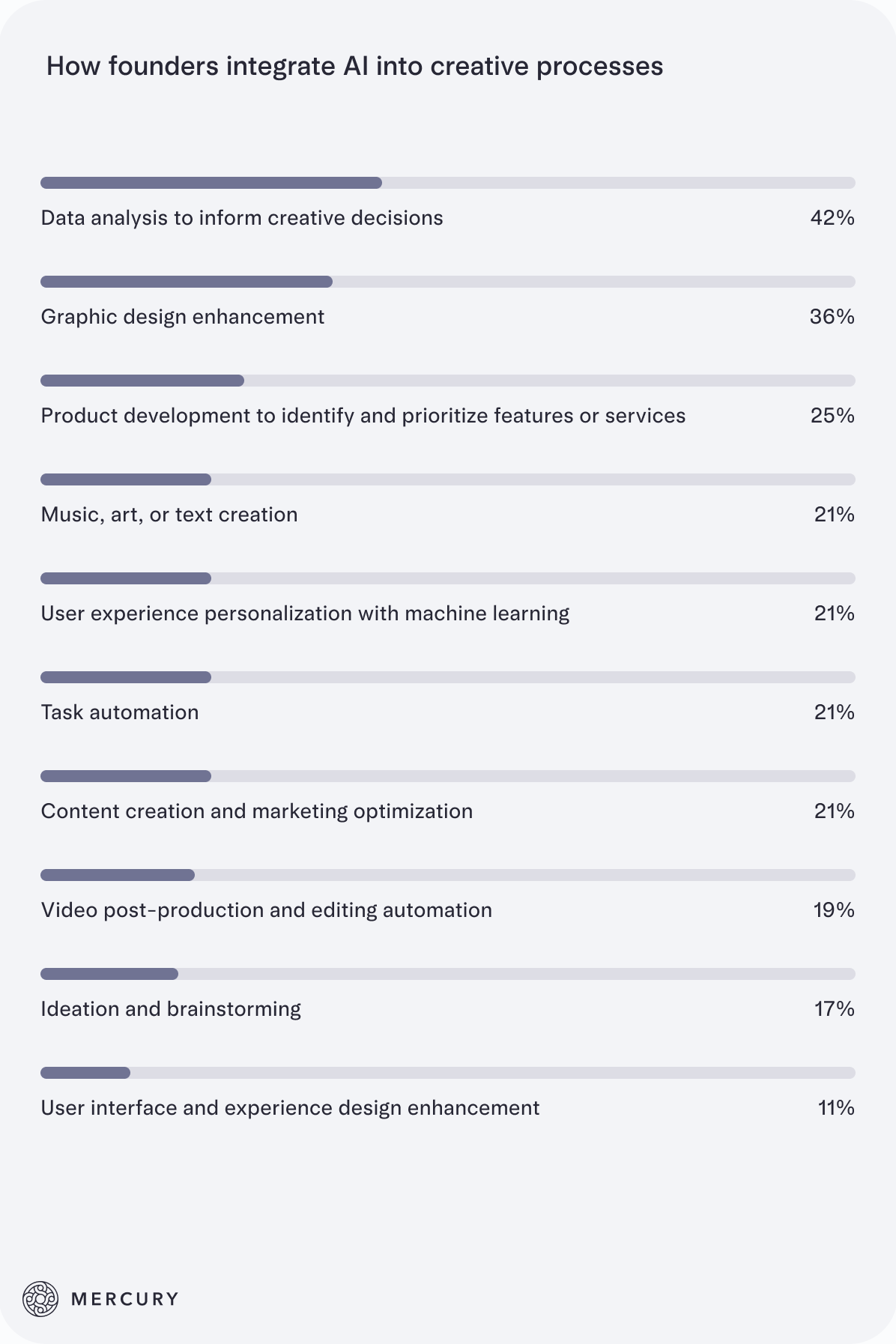
However, blending technological advancements with creativity isn’t without its hurdles, as almost one-quarter of founders report resistance against AI from creative teams. To navigate these challenges, founders report using various strategies, including:
- Holding team discussions to address AI integration concerns (50%)
- Launching pilot projects to showcase AI’s potential (42%)
- Collaboratively identifying where to implement AI (42%)
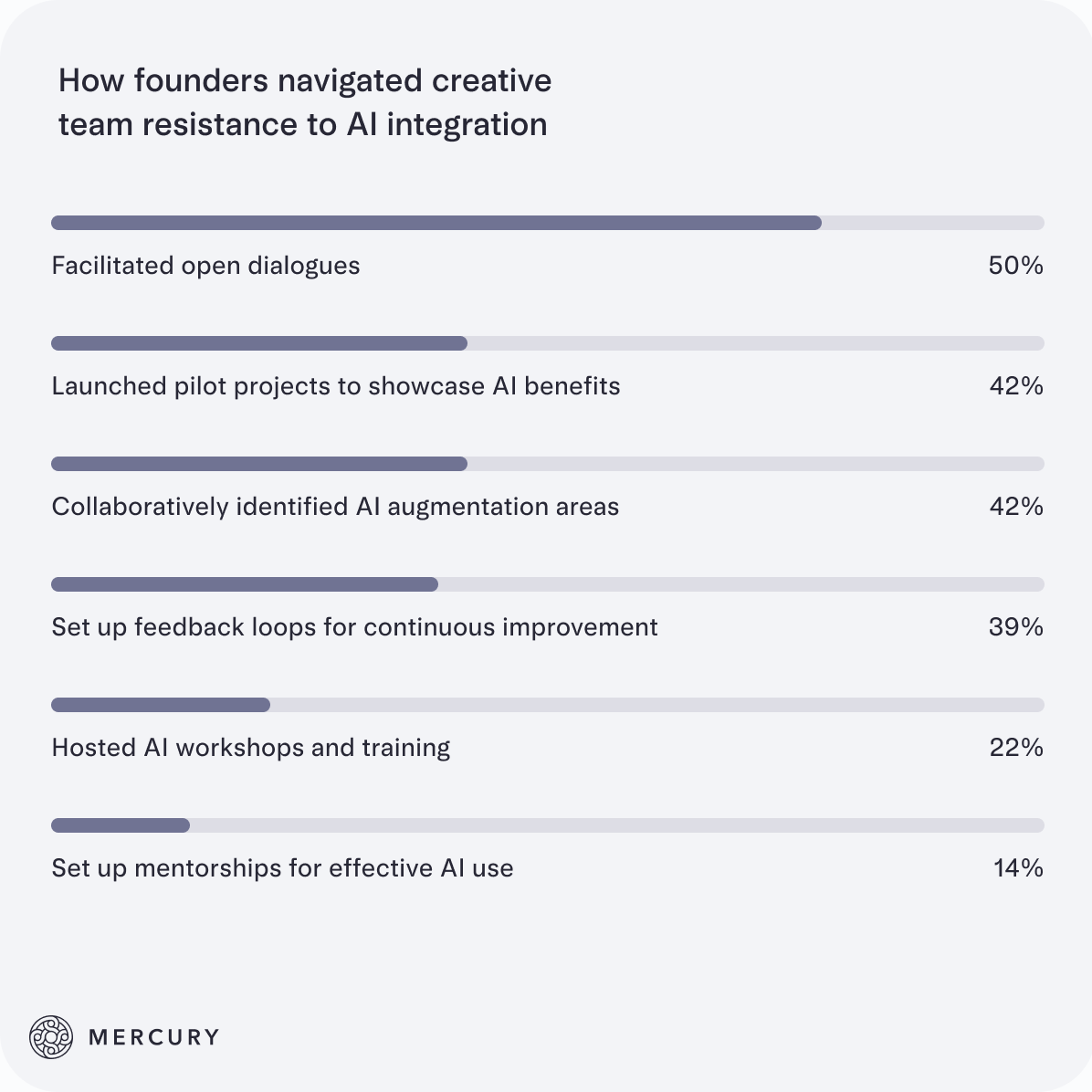
Overall, the strategies are heavily anchored in a sense of working together with creatives to understand the place of AI in existing processes and workflows. This helps foster an environment where technology and human creativity complement one another, rather than create friction.
Another consideration for startup leaders thinking about how to encourage AI adoption within creative teams is to invest in AI tool education and training, like courses on how to properly prompt AI (suggestions on that later). It also helps to start with small-scale integrations and gradually build upon successful implementations, boosting creatives’ understanding and confidence in the process.
How AI is shaping the workplace
One of the top concerns regarding AI integration is job loss, so we asked startup founders about the impact of AI on creative jobs since ChatGPT exploded onto the scene in late 2022, followed swiftly by a host of other tools that have quickly garnered attention. How many creatives have lost jobs to AI since then, and which roles are most at risk?
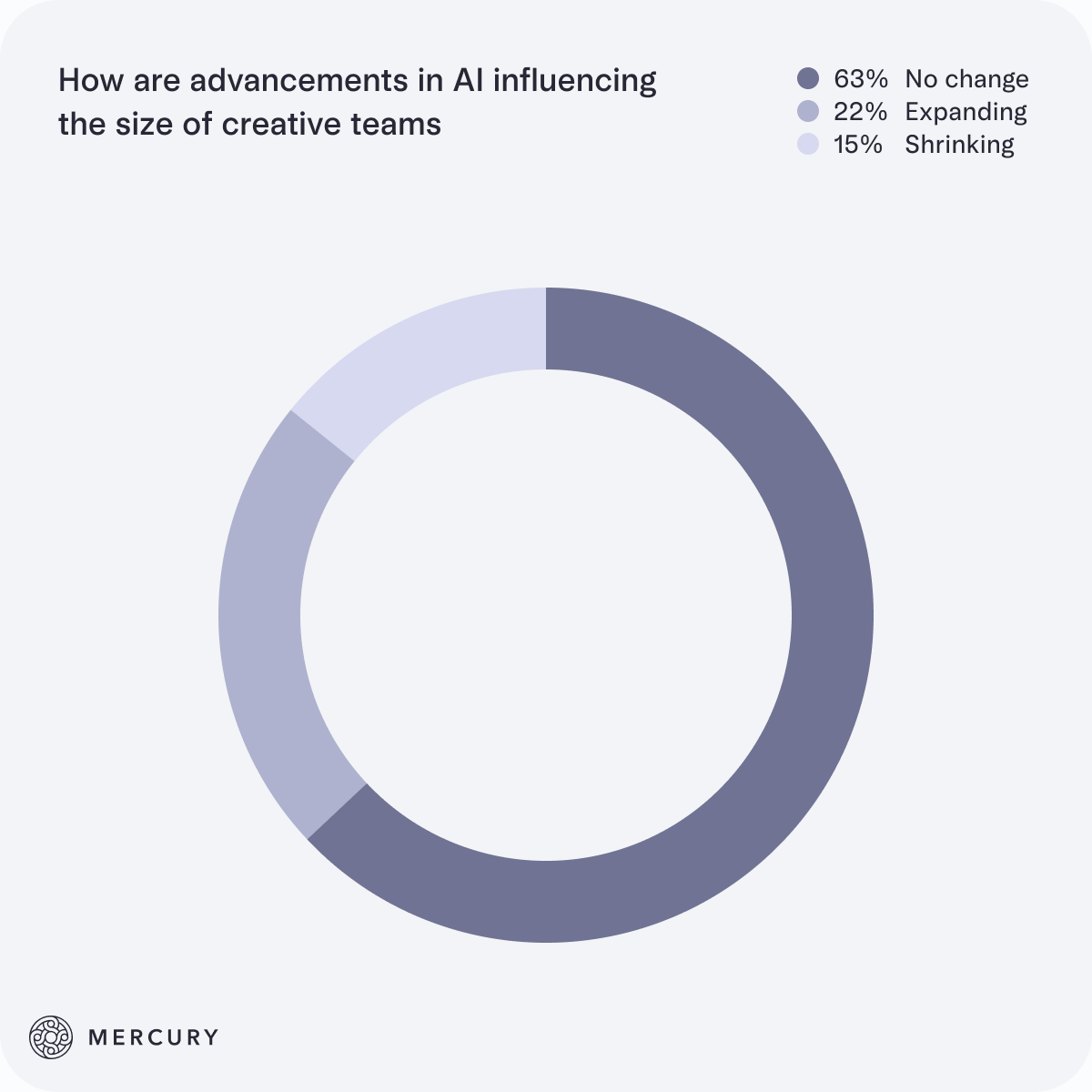
Following the increased adoption of AI within the past year, an encouraging 63% of founders maintained the size of their creative teams, while 22% expanded and 15% let people go. The creative jobs most impacted by AI were content writers (27%), social media managers (22%), and graphic designers (21%).
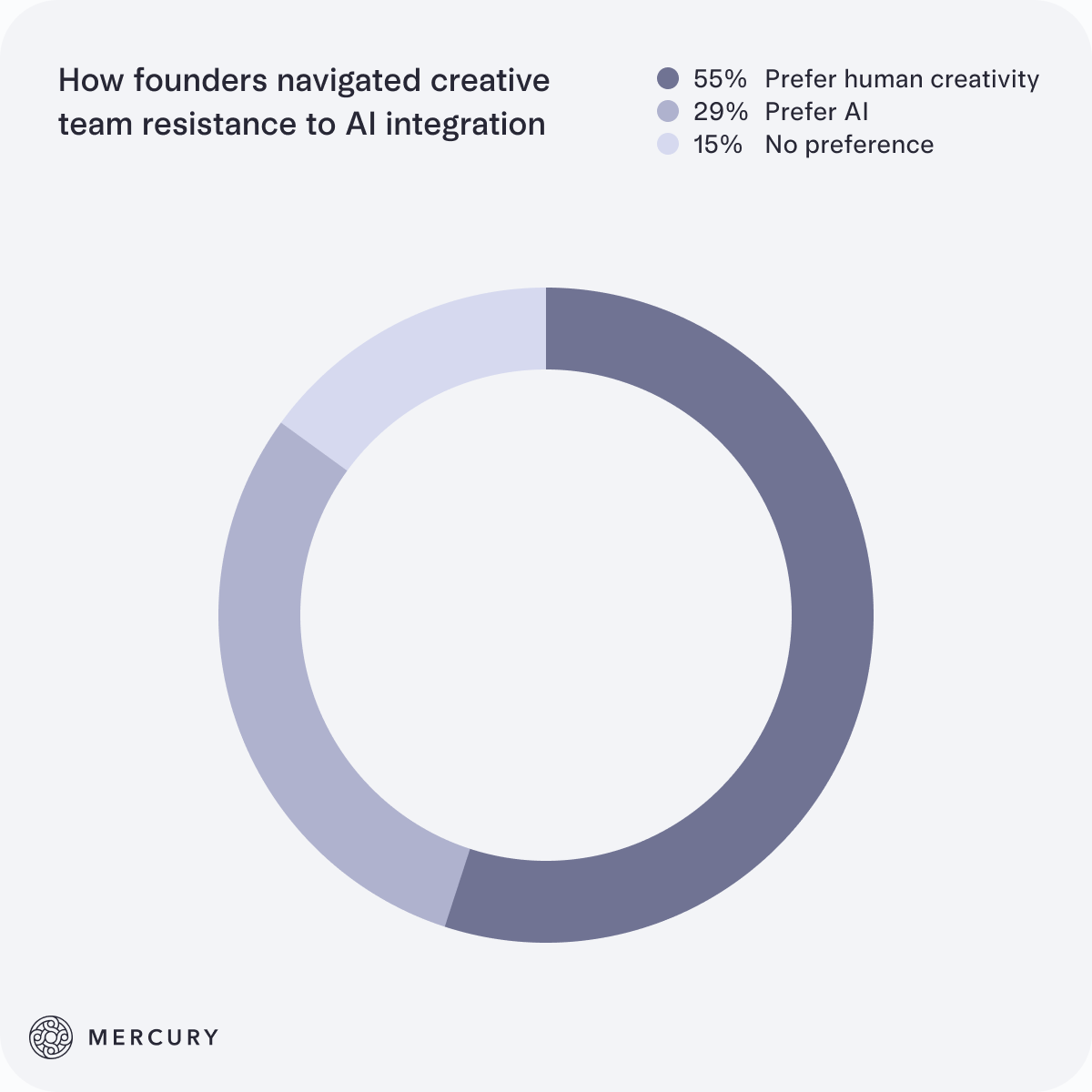
While more than half of founders said they prefer human creativity to AI, 55% had higher expectations for creative roles following the adoption of AI, the idea largely being that creatives would need to consistently deliver high-quality, highly original work that couldn’t be easily generated or replicated by AI.
This increase in expectations also comes down to output — AI tools can be a powerful way to streamline repetitive tasks, generate inspiration or first drafts, or automate reporting to easily measure impact, just to name a few applications. By considering how AI can help expedite work flows and free up time for more imaginative thinking and strategy, creatives can understand how to leverage these tools to empower them rather than compete with them — a critical step forward, especially as 79% of founders said they expect AI and human creativity to coexist and complement each other in the future. The coexistence of human creativity and AI will not become only a necessity, but a path to unlocking new levels of creative potential and value in the workplace.
AI as a creator’s tool
With a better understanding of founders’ views on AI integration, let’s explore how creatives view AI in the workplace. How have they embraced AI in the creative process, and which tools do they use?
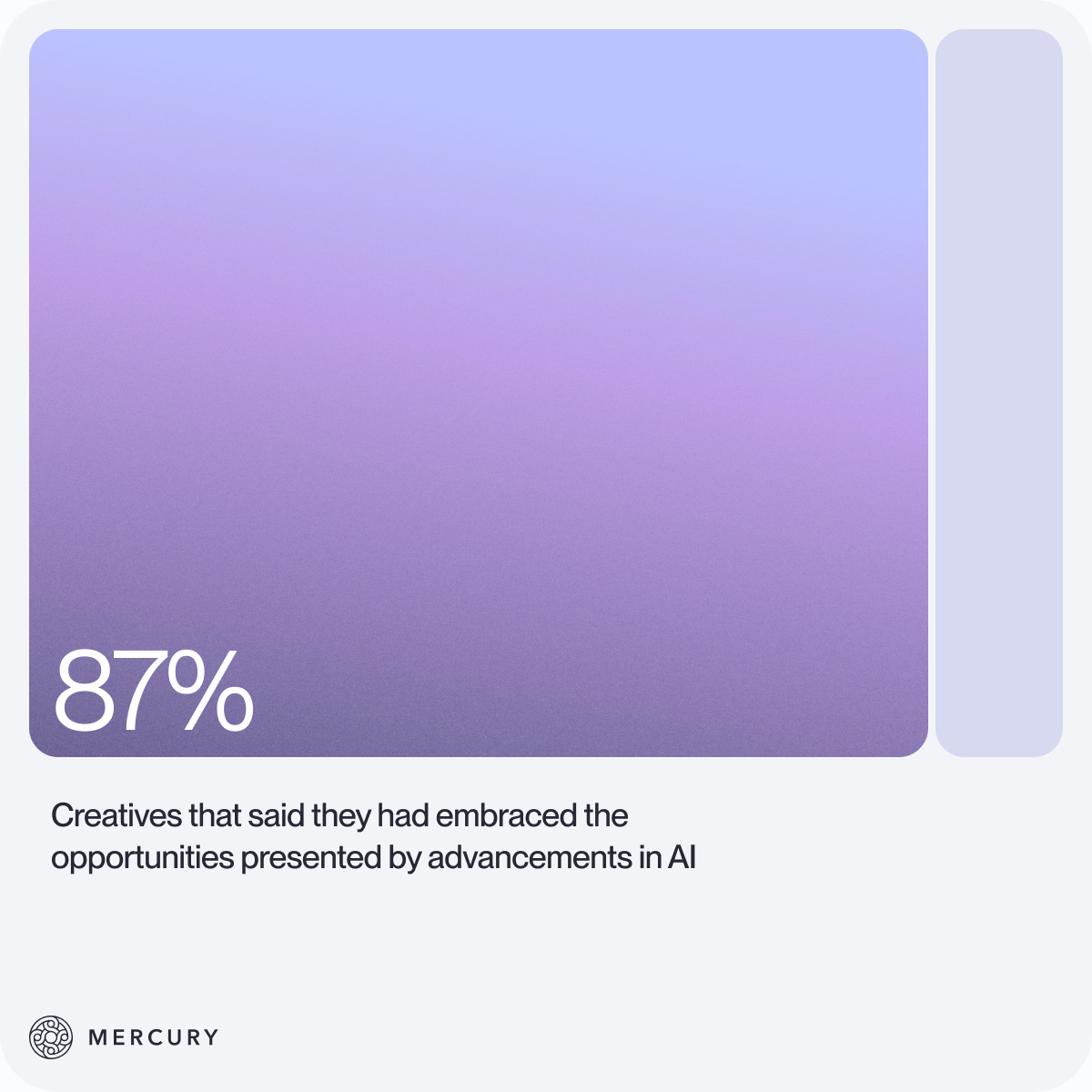
A significant 87% of creatives willingly adopted AI, with tools like ChatGPT and Bard becoming part of their workflows. Since implementing AI into their processes, creatives report experiencing some positive changes that they credit at least in part to the tool(s), including:
- Starting a side gig or hustle (52%)
- Receiving a promotion (41%)
- Feeling greater job security (39%)
- Receiving a raise (10%)
Leveraging AI as a helpful tool likely enhances the quality and efficiency of employees’ work, freeing up time for further creativity and innovation. Completing their usual tasks faster could have led to additional work responsibilities, making them a more valuable asset and leading to promotions, raises, and increased job security. AI may have also alleviated creative blocks and fostered expanded thinking, which could have guided creatives to new ventures.
That said, while many creatives see some value in AI as a part of their toolkit, they’re not totally convinced by its ability to perform at the level of a skilled creative. According to our survey, 76% of creatives believe that AI tools don’t have the capacity to fully replace human input in the creative process, and 53% even pointed to experiences where they attempted to use AI to complete a project or task, only to find that the outcome fell significantly short of their expectations.
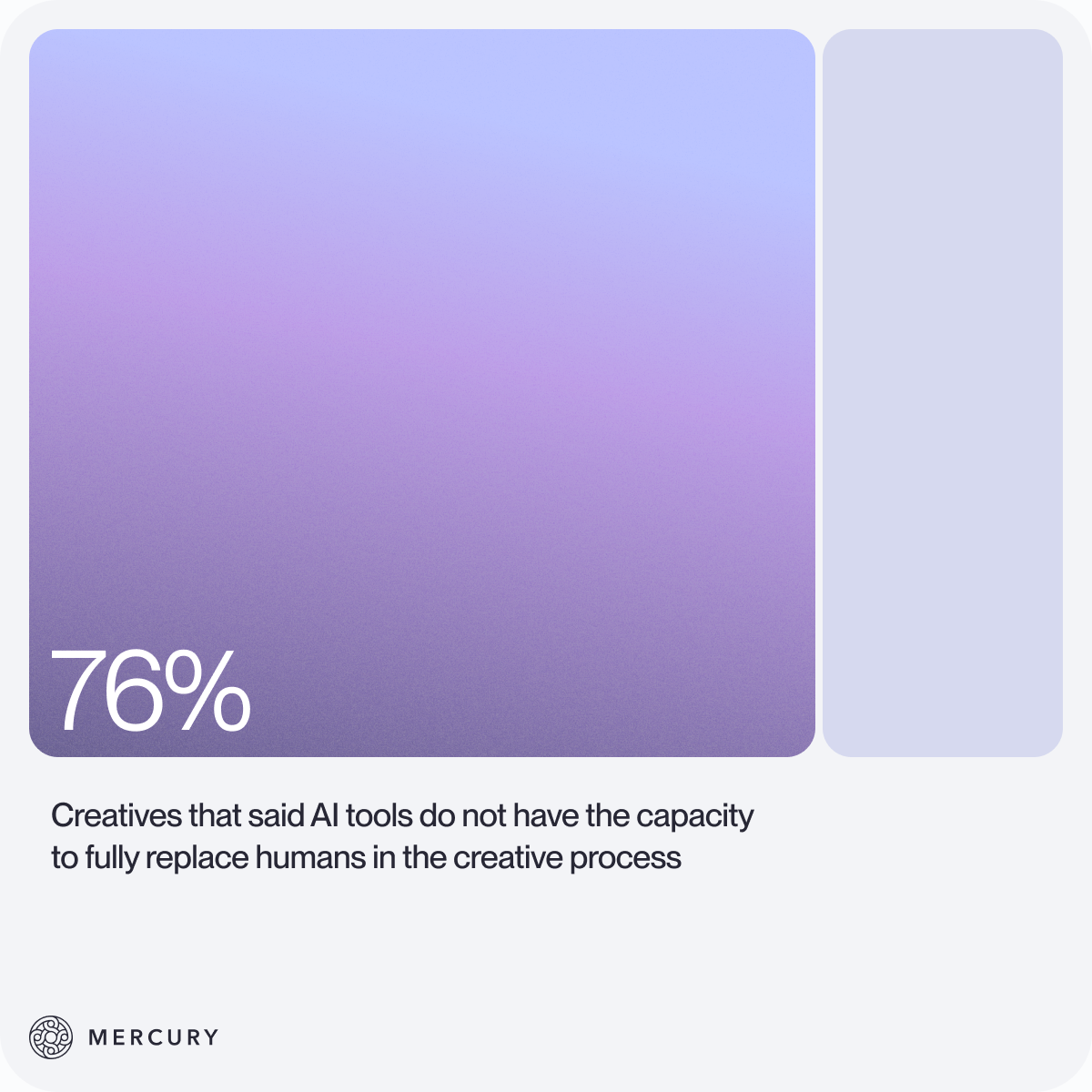
Of course, finding success with AI tools largely comes down to mastering the art of the prompt. Creatives can often find greater success with AI chatbots after adjusting their inputs, and it often takes some trial and error to understand the correct amount of information and guidance needed in an initial prompt to reach a desired result. Creatives looking to hone their AI prompting skills can consider the following resources to learn more about proper tool prompting:
- Learn Prompting Course
- Prompt Engineering for ChatGPT by Vanderbilt University
- GPT Best Practices
- Prompt Engineering for Generative AI
- PromptHero
- AI Prompt Library - Content at Scale
As AI becomes a regular part of creative workflows, we should remember that we’re witnessing the early stages of a major transformation. AI tools are an ongoing experiment, continually learning from human input and improving over time. Those frustrated by prior attempts at integrating AI should keep trying and learning how best to work with them.
Creative concerns over AI integration
To wrap up our study, we asked creatives about the future of AI in the workplace. Does AI have a place in the creative process? If so, what concerns do creatives have concerning AI, and how can employers address them?
While AI’s infusion into creativity has advantages, the creatives we surveyed still expressed significant concerns about AI in the workplace. The most common threat felt by creatives was job loss, with 62% feeling insecure in their position. Another 58% of creatives had ethical and privacy concerns, and 55% feared AI use would cause a decline in creativity.
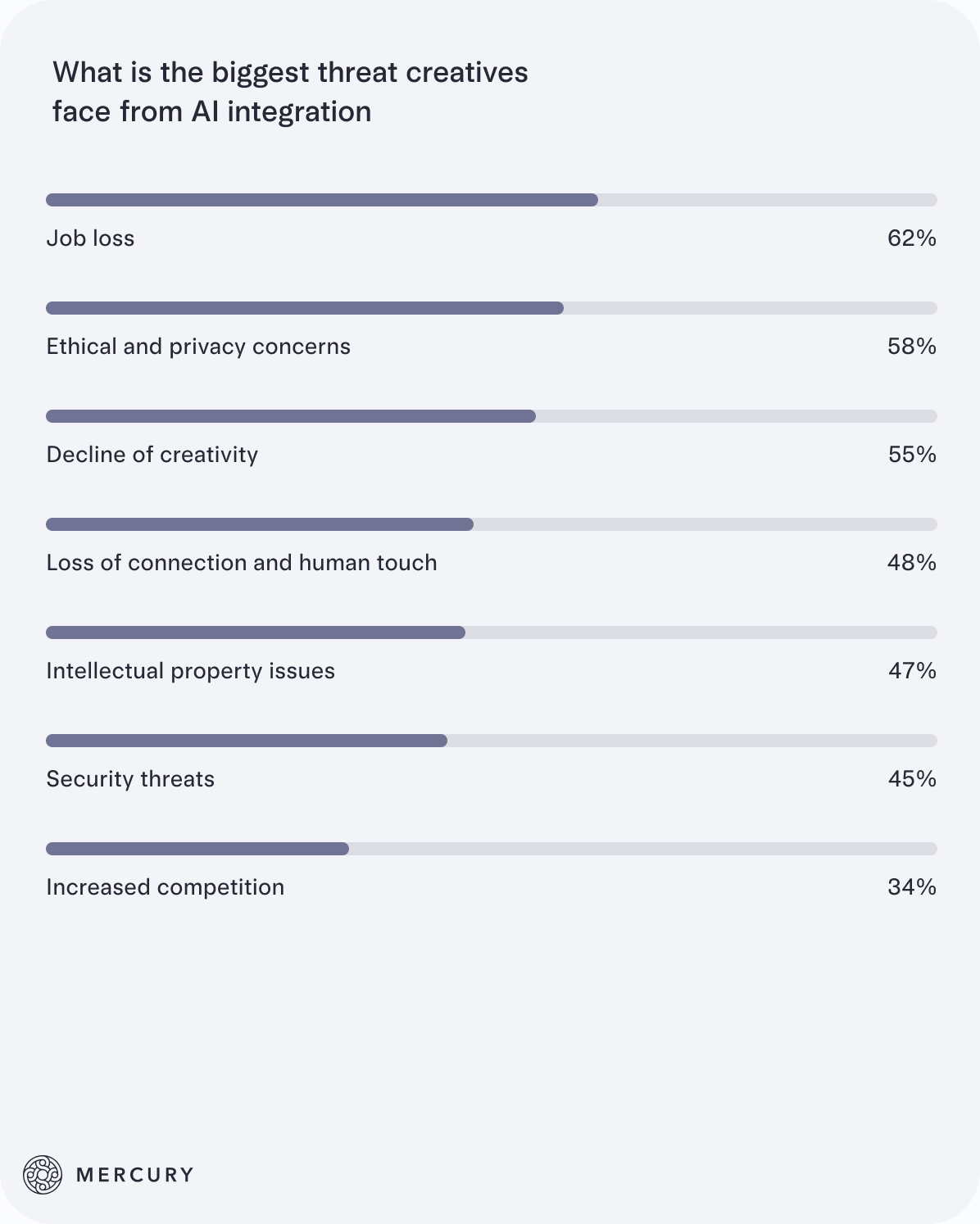
To combat these concerns, 61% of creatives believed employers should implement regular AI training and upskilling programs. These programs may involve crafting effective prompts, exploring different AI tools, and carefully reviewing AI-generated content in a way that meets the company’s goals.
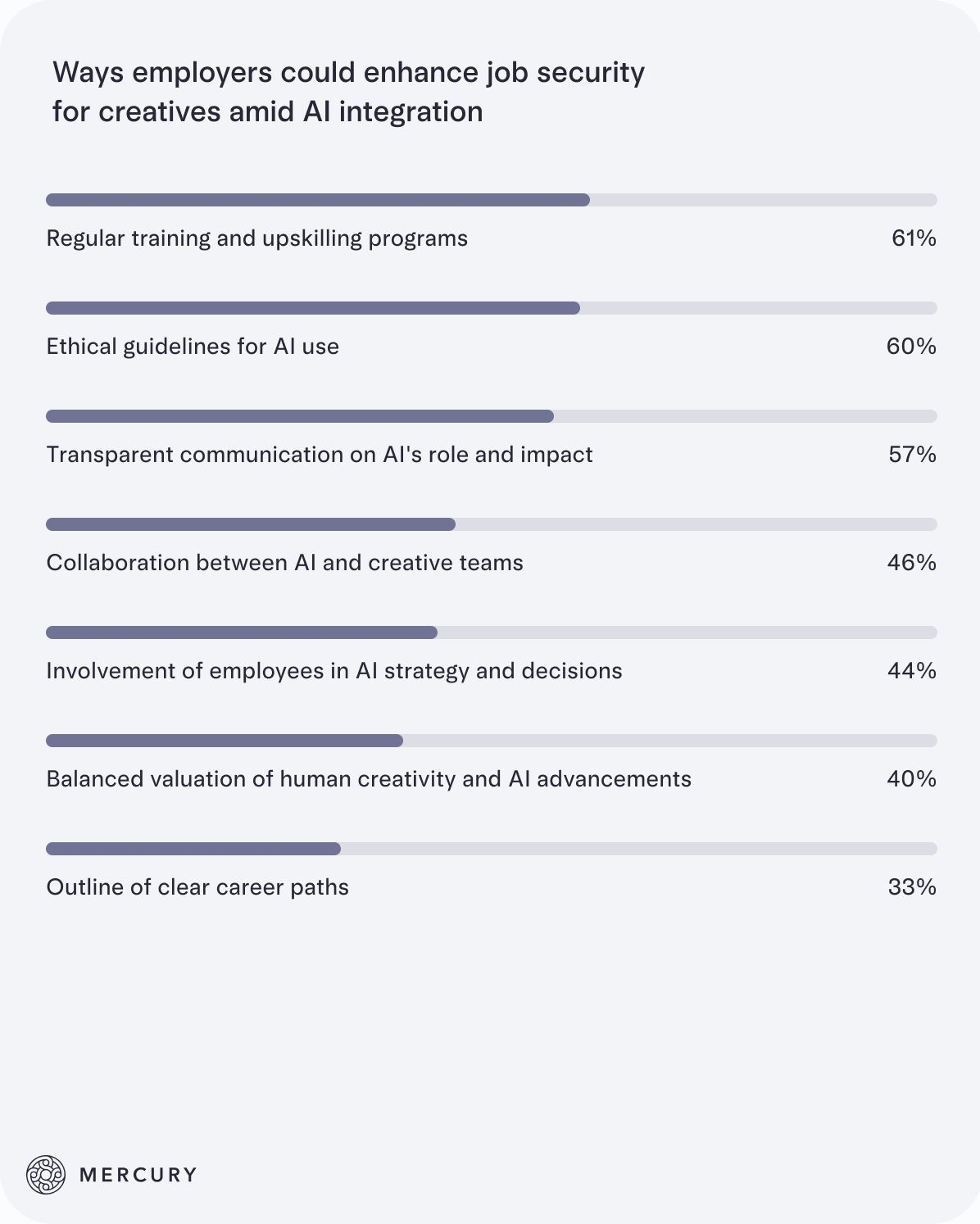
Furthermore, 60% felt ethical guidelines for AI use were vital, and 57% wanted transparent communication about the company’s AI initiatives and their intentions and expectations surrounding the technology’s use.
Unfortunately, some creatives were unsatisfied with their employers’ efforts to integrate AI, as 39% felt leadership had not taken steps to assure job security. Additionally, 31% of creatives believed employers were not transparent regarding AI objectives, and 29% felt company leadership acted unethically in their adoption of AI. Instances of ethical concerns could include the mishandling of sensitive user data, biased algorithms that perpetuate discrimination, or the misuse of AI-generated content to manipulate public opinion.
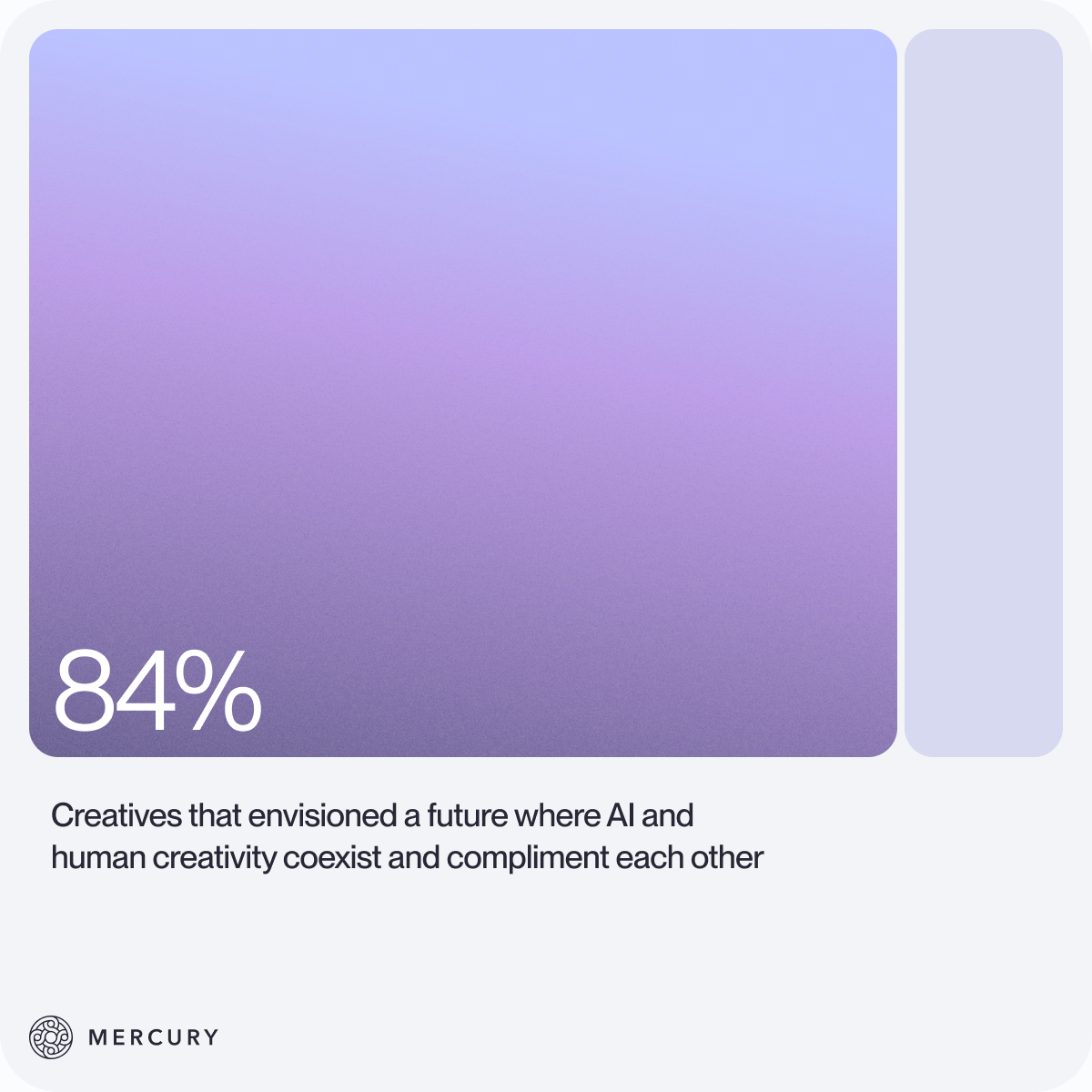
Despite these concerns, creatives remained optimistic in their views on AI, as 84% envisioned a future where AI and human creativity coexist and complement each other.
The future of AI creativity
As we integrate artificial intelligence into our daily lives, its use continues to raise practical and ethical concerns, especially regarding creative spaces. While startup founders and creatives embrace AI’s capabilities, most agree that human creativity is irreplaceable. As businesses move forward with AI in the workplace, employers must address employee fears and help creatives see AI as a tool to complement their work, not a threat to replace them. If creatives and AI can work together, human imagination can become truly limitless.
Methodology
Mercury surveyed 150 startup founders and 486 creative professionals in the U.S. about the integration of AI into the creative process. The majority of creative professionals surveyed worked in one of the following roles: animator, art director, content creator/writer, graphic designer, illustrator, music/sound designer, photographer, social media manager, UI/UX designer, and videographer.
Fair use statement
Curious about integrating AI into a creative working environment? Share our discoveries and tag/link back to our report in your commentary.
Related reads

Report: The new economics of modern love
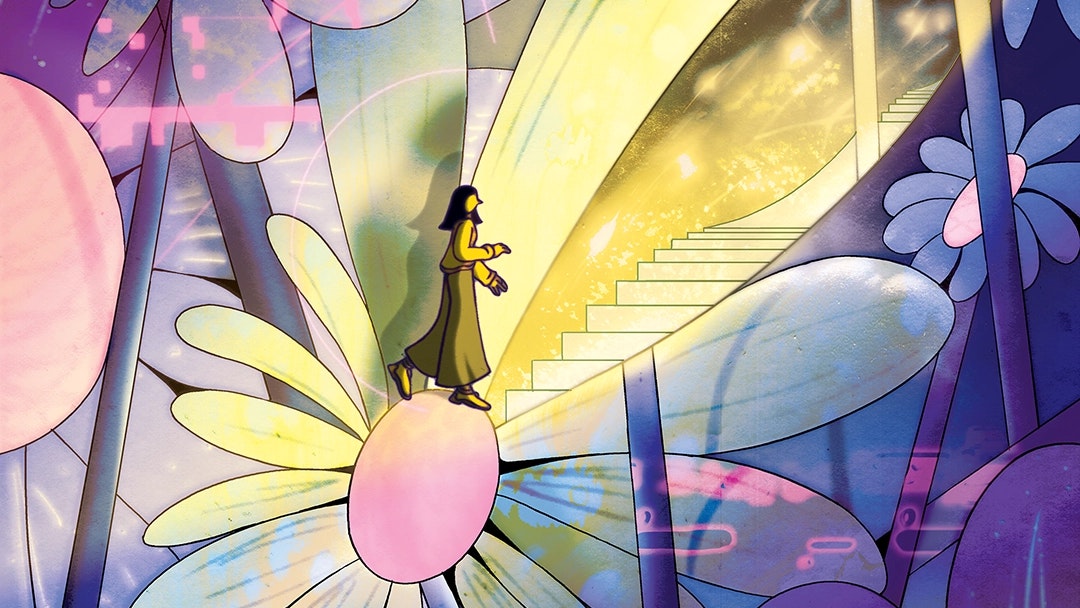
The world is an array of edits
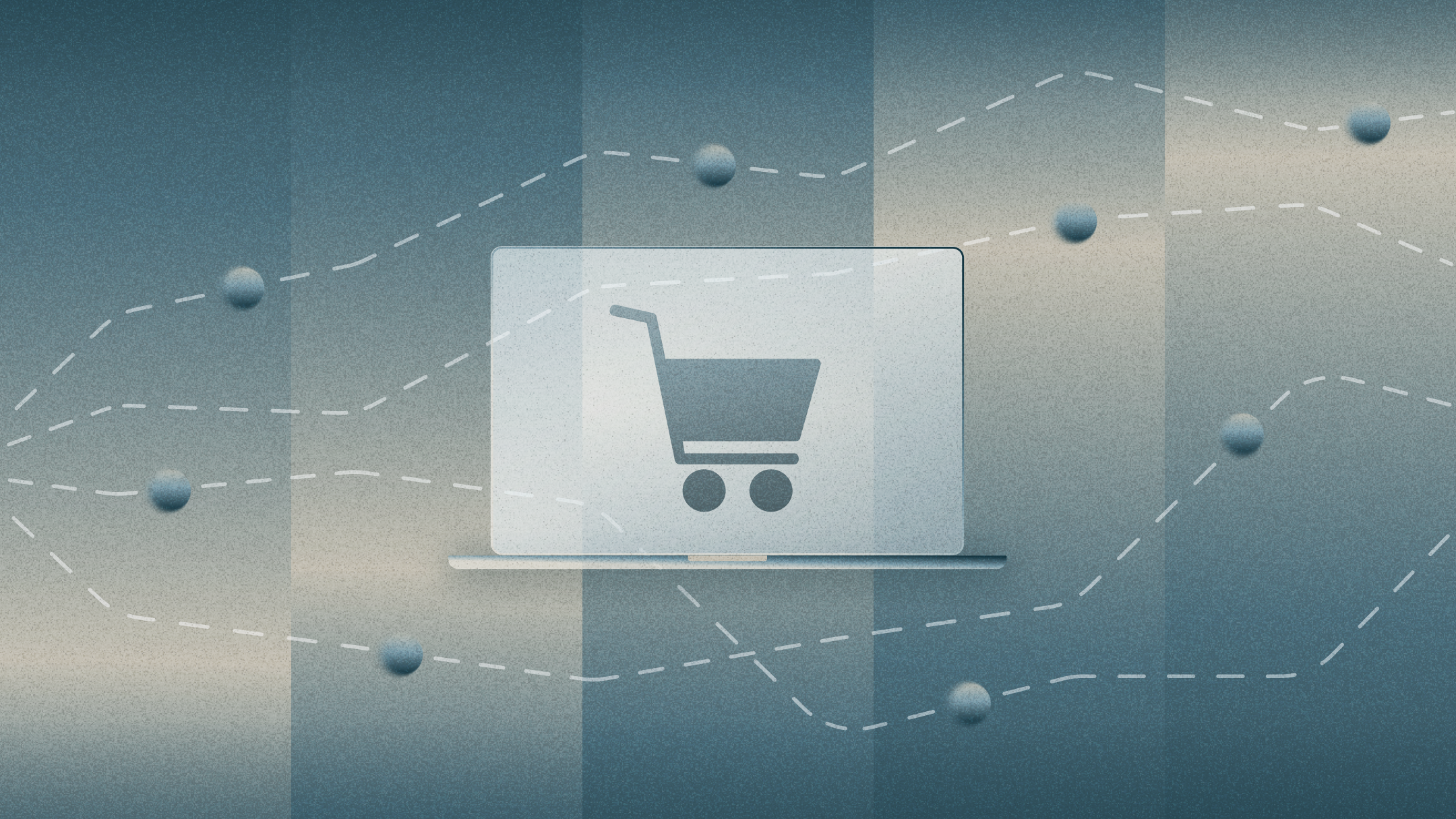
2025 Ecommerce Holiday Report: Headwinds, High Hopes, and AI Acceleration
